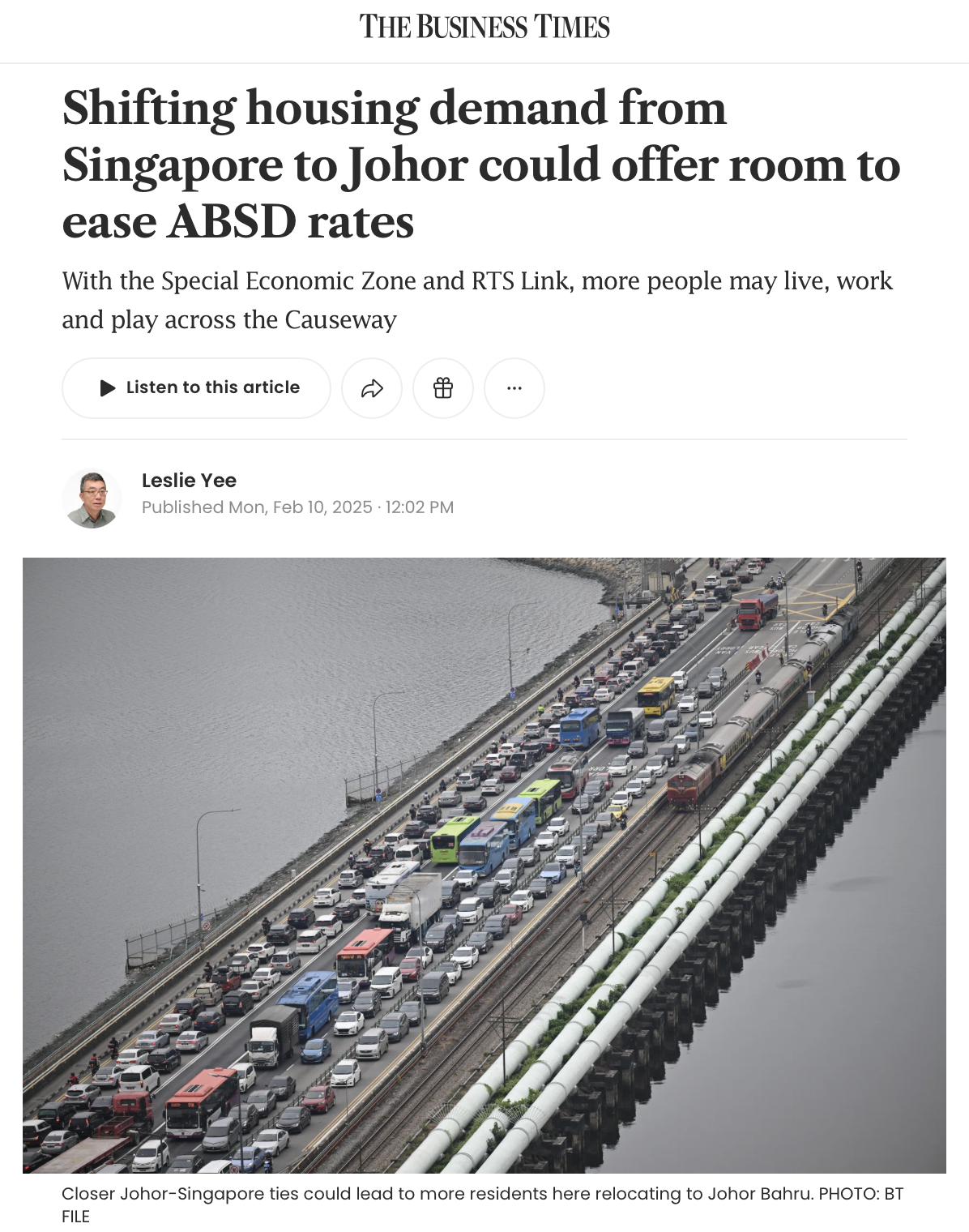PropNex Picks
|September 30,2025RTS Link: More Than Just a Train
Share this article:

Crossing the Causeway may take minutes instead of hours?

The Johor Bahru - Singapore RTS Link is expected to improve connectivity between Singapore and Malaysia by the end of 2026. If all goes according to plan, then it'll only take six minutes to go to and from Woodlands and Bukit Chagar stations, which are 4km apart.
But beyond cutting travel time, this transport upgrade could also quietly shift our property and rental market. So, what would that mean for you? Let's unpack it.
At first glance, the RTS Link seems to benefit JB more than Singapore. After all, easier access means Singaporeans can head over more often for cheaper groceries, dining, and leisure, which funnels immediate spending into JB's economy. Malaysian workers who currently need to rent or buy properties in Singapore may not need to anymore since commute is being cut short. The RTS link could also elevate JB's image as it becomes a natural extension of Singapore.
So, why would Singapore want the RTS link at all?

Aside from easing the Causeway congestion, the RTS could help Woodlands grow into a business hub as URA highlighted in the latest Master Plan update. This will strengthen Woodlands' position as Singapore's Northern Gateway.
At the same time, Singapore's workforce is getting older and more educated, which means fewer locals are drawn to roles in sectors like frontline services, manufacturing, transport and healthcare support, the very functions that keep the economy running behind the scenes. Service staff, bus captains, technicians, nurses, operators and delivery riders remain vital. If Singaporeans step away from these jobs, many of those gaps are likely to be filled by cross-border workers from Malaysia.
And since Singapore is open to foreigners who bring in skills that are in short supply, to complement the local workforce, the RTS link will help make this flow smoother and more predictable. This all matters for real estate because it directly shapes where housing and rental demand shows up. On that note...
Since the RTS link is yet to be completed, the following will be hypothetical of course. But here are some ways the upcoming train could affect the property market.
Residential
It's very much possible that the RTS could dampen housing demand in Singapore, particularly from Malaysian workers. With the new six-minute ride, there's less incentive for cross-border workers to buy homes in Singapore just to save time on the commute. Instead, they can continue living in JB, where property is far more affordable.
With less demand, prices (especially in the Northern region) are likely to drop as well. If that happens, then it could be a good opportunity to enter the market. But if you're selling, it might be a good idea to plan your exit strategy sooner rather than later.
The rental market could also take a hit since demand may soften as well, especially lower-end units in Northern estates like Woodlands, Marsiling, and Yishun, where landlords have traditionally catered to Malaysian tenants.
Think about it. A single HDB room can cost anywhere between S$500 and S$1,800 per month, which works out to around $16 - $60 a night. Meanwhile, a budget hotel in Singapore might cost about $30 - $80 a night. So if a worker only needs to stay over once or twice a week, that occasional hotel expense could work out cheaper overall than paying rent every month. With the RTS making daily commuting easier, many might choose this flexible arrangement instead of committing to a rental, especially since short-term rentals like Airbnb are illegal in Singapore.

That said, RTS' overall impact on our housing and rental may not be as substantial as we fear. Remember, commuters will still have to clear immigration every time they cross the border. So it's possible that living in Singapore could remain the preferred choice for those who value stability, convenience, or have families with children in our schools.
Still, if enough workers shift back to JB housing, this easing might give policymakers room to rethink current cooling measures like Additional Buyer's Stamp Duty (ABSD). HDB may even reconsider their current rental policies, such as the 30-month wait-out period and the maximum occupancy cap. Of course, all this would depend on broader housing trends too, on top of the RTS link.

Commercial & Retail
As I've mentioned, URA is already planning for Woodlands to be a key business hub. When the new RTS link is ready, we can expect more people to travel between JB and Singapore. Daily commuters or visitors can bring spending power, which naturally creates business opportunities. This can benefit nearby shops, services, and even hotels, and therefore increase the value of commercial and retail properties in the Northern areas

Industrial
Industrial properties in the Northern belt could also get a boost. Easier access to manpower means companies in warehousing, light manufacturing, and logistics may find it more efficient to expand or anchor operations here. While the immigration process remains, the predictability of RTS travel time reduces the costly downtime compared to Causeway traffic today.
In the end, the RTS Link is more than just a train. It isn't even here yet, but it's already got everyone talking about how this could shift our housing demand, and even change how businesses and industries see Woodlands. Alas, it's all talk and speculation for now because we won't really know what will happen until the trains start running.
Will rental demand in Northern estates really shrink? Could Woodlands be the new CBD? Will more Singaporeans move to live in JB? Will policymakers ease ABSD?
These are questions that we will need to watch closely as the RTS Link nears completion. For now, here are some other articles you might be interested in:
MRT Line Showdown: Which Route in SG Leads to Property Gold?, Future-Ready: Where SG's Next Reclaimed Estates May Rise, 2025 Master Plan Just Dropped - Anything New In Your Neighbourhood?
Views expressed in this article belong to the writer(s) and do not reflect PropNex's position. No part of this content may be reproduced, distributed, transmitted, displayed, published, or broadcast in any form or by any means without the prior written consent of PropNex.
For permission to use, reproduce, or distribute any content, please contact the Corporate Communications department. PropNex reserves the right to modify or update this disclaimer at any time without prior notice.



